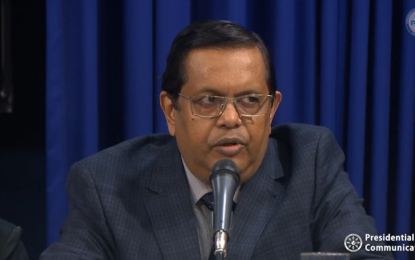
World Health Organization Country Representative Dr. Rabindra Abeyasinghe (Screengrab)
MANILA -- The novel coronavirus disease 2019 (Covid-19) is transmitted largely by symptomatic people, an official of the World Health Organization (WHO) said Tuesday.
"The evidence that asymptomatic people are transmitting this disease is very weak. Almost 90 percent of the disease is transmitted by symptomatic people, so we need to focus expressly on symptomatic people to maximize the benefit of the enhanced community quarantine now being implemented," WHO Country Representative Dr. Rabindra Abeyasinghe said at the Laging Handa public briefing.
Abeyasinghe said the WHO has looked into reports saying the loss of sense of smell and taste are possible signs of Covid-19 infection.
"These have not yet been confirmed. The focus should be on the key clinical features of this disease -- acute respiratory infection accompanied by fever and sore throat," he said, adding that focus on the identification of such symptoms would aid in the immediate isolation of symptomatic individuals.
Citing the limited supply of test kits in the country, Abeyasinghe advised that these must be used in testing symptomatic people with severe disease, people with pneumonia and acute respiratory distress syndrome, and the elderly with co-morbidities or those who have underlying conditions.
"This can help improve the identification and management of the people who have the disease and be used in contact tracing and isolating people at high-risk to limit further transmission," he said.
To date, the Department of Health has reported a total of 501 confirmed positive cases, 19 recoveries and 33 deaths in the country.
In its latest situation reported dated March 23, the WHO has reported 332,930 confirmed positive cases and 14,510 deaths worldwide. (PNA)
